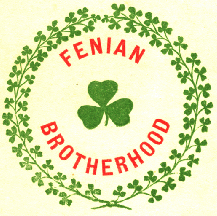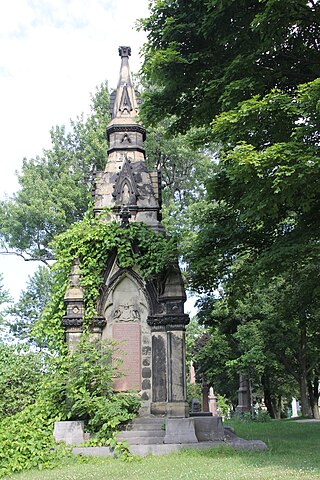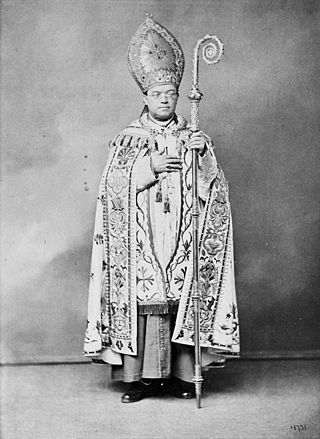
The Fenian Brotherhood was an Irish republican organisation founded in the United States in 1858 by John O'Mahony and Michael Doheny. It was a precursor to Clan na Gael, a sister organisation to the Irish Republican Brotherhood (IRB). Members were commonly known as "Fenians". O'Mahony, who was a Gaelic scholar, named his organisation after the Fianna, the legendary band of Irish warriors led by Fionn mac Cumhaill.

Thomas D'Arcy McGee was an Irish-Canadian politician, Catholic spokesman, journalist, poet, and a Father of Canadian Confederation. The young McGee was an Irish Catholic who opposed British rule in Ireland, and was part of the Young Ireland attempts to overthrow British rule and create an independent Irish Republic. He escaped arrest and fled to the United States in 1848, where he reversed his political beliefs. He became disgusted with American republicanism, Anti-Catholicism, and Classical Liberalism. McGee became intensely monarchistic in his political beliefs and in his religious support for the embattled Pope Pius IX.

The Irish Republican Brotherhood was a secret oath-bound fraternal organisation dedicated to the establishment of an "independent democratic republic" in Ireland between 1858 and 1924. Its counterpart in the United States of America was initially the Fenian Brotherhood, but from the 1870s it was Clan na Gael. The members of both wings of the movement are often referred to as "Fenians". The IRB played an important role in the history of Ireland, as the chief advocate of republicanism during the campaign for Ireland's independence from the United Kingdom, successor to movements such as the United Irishmen of the 1790s and the Young Irelanders of the 1840s.

Events from the year 1868 in Canada.

Irish Canadians are Canadian citizens who have full or partial Irish heritage including descendants who trace their ancestry to immigrants who originated in Ireland. 1.2 million Irish immigrants arrived from 1825 to 1970, and at least half of those in the period from 1831 to 1850. By 1867, they were the second largest ethnic group, and comprised 24% of Canada's population. The 1931 national census counted 1,230,000 Canadians of Irish descent, half of whom lived in Ontario. About one-third were Catholic in 1931 and two-thirds Protestant.

The Fenian raids were a series of incursions carried out by the Fenian Brotherhood, an Irish republican organization based in the United States, on military fortifications, customs posts and other targets in Canada in 1866, and again from 1870 to 1871. A number of separate incursions by the Fenian Brotherhood into Canada were undertaken to bring pressure on the British government to withdraw from Ireland, although none of these raids achieved their aims.

Irish Quebecers are residents of the Canadian province of Quebec who have Irish ancestry. In 2016, there were 446,215 Quebecers who identified themselves as having partial or exclusive Irish descent in Quebec, representing 5.46% of the population.

The Battle of Ridgeway was fought in the vicinity of the town of Fort Erie across the Niagara River from Buffalo, New York, near the village of Ridgeway, Canada West, currently Ontario, Canada, on June 2, 1866, between Canadian troops and an irregular army of Irish-American invaders, the Fenians. It was the largest engagement of the Fenian Raids, the first modern industrial-era battle to be fought by Canadians and the first to be fought only by Canadian troops and led exclusively by Canadian officers. The battlefield was designated a National Historic Site of Canada in 1921 and is the last battle fought within the current boundaries of Ontario against a foreign invasion. The action at Ridgeway has the distinction of being the only armed victory for the cause of Irish independence between the Irish Rebellion of 1798 and the Easter Rising in 1916.

Patrick James Whelan was a suspected Fenian supporter executed following the 1868 assassination of Irish journalist and politician Thomas D'Arcy McGee.

William Randall Roberts was a Fenian Brotherhood member, United States Representative from New York (1871–1875), and a United States Ambassador to Chile. Roberts, an Irish immigrant who became a wealthy businessman, rose quickly to a position of major influence amongst the Fenian Brotherhood before eventually taking leadership. Under his direction, the Fenians in America moved to use Irish-American veterans of the American Civil War to invade Canada in the hopes that they could leverage this against the British Empire to negotiate for an Independent Irish Republic. After the first attempt to invade Canada was not successful, Roberts resigned from the leadership of the Fenians and began to transition into American politics. He served as a United States Representative from New York and Ambassador to Chile until a stroke ended his career.

Daniel Tracey born in Roscrea, Tipperary County, Ireland, was a doctor, journalist and Canadian politician.

Henry James O'Farrell was the first person to attempt a political assassination in Australia. On 12 March 1868, he shot and wounded Prince Alfred, Duke of Edinburgh, the second son and fourth child of Queen Victoria.

Sir Frank Smith, was a Canadian businessman and senator.

John Joseph Lynch was an Irish prelate of the Catholic Church. A member of the Congregation of the Mission, he served as the third Bishop (1860-1870) and first Archbishop of Toronto (1870-1888). He founded Our Lady of Angels Seminary in 1856.
Patrick D'Arcy (1598–1668) was an Irish Catholic Confederate and lawyer who wrote the constitution of Confederate Ireland.
Events from the year 1825 in Ireland.

Bernard Devlin, was an Irish-born lawyer, counsel to the Abraham Lincoln administration of the United States Government during the most northerly engagement of the United States Civil War, Quebec-based political figure and Canadian parliamentarian, and peer and political competitor of Thomas D'Arcy McGee. A champion of many causes, generally of a liberal persuasion, his abilities as a criminal advocate and oratorical skill established for him a wide reputation throughout the then-Dominion of Canada, and his motto: "justice and equality to all classes and creeds, undue favor to none" was far in advance of the tenor of the times.

The Dominion Police Force was the federal police force of Canada between 1868 and 1920, and was one of the predecessors of the Royal Canadian Mounted Police. It was the first federal police force in Canada, formed the year following the Canadian Confederation to enforce federal laws and perform policing duties for the Federal Government of Canada. On 1 February 1920, the Dominion Police was merged with the Royal North-West Mounted Police to form the Royal Canadian Mounted Police as the new federal police force of Canada.

The word Fenian served as an umbrella term for the Irish Republican Brotherhood (IRB) and their affiliate in the United States, the Fenian Brotherhood, secret political organisations in the late 19th and early 20th centuries dedicated to the establishment of an independent Irish Republic. In 1867 they sought to coordinate raids into Canada from the United States with a rising in Ireland. In the 1916 Easter Rising and the 1919–1921 Irish War of Independence, the IRB led the republican struggle.















